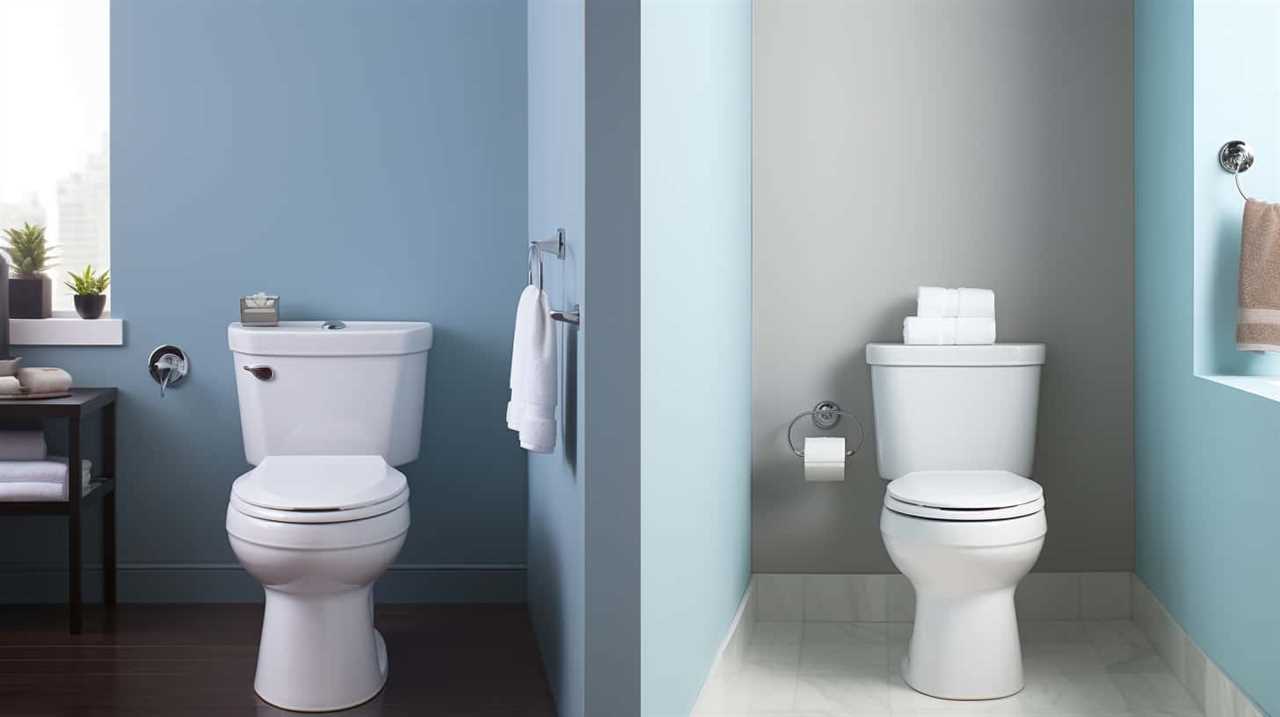Are you curious about the appropriateness of throwing dog feces into a river? Let’s explore the environmental consequences, health hazards, and possible dangers to aquatic creatures posed by canine waste.
We’ll also explore safe and proper disposal methods and the effects of dog waste on human health.
By the end, you’ll be equipped to make an informed decision about responsible waste disposal. Let’s get started!
Key Takeaways
- Dog waste contains harmful bacteria and parasites that can contaminate water sources and pose risks to human and environmental health.
- Proper disposal of dog waste in designated trash bins is essential to mitigate water pollution and prevent the accumulation of dog waste.
- Dog waste can lead to eutrophication, deplete oxygen levels, and harm fish and other aquatic organisms.
- Pollution from dog waste can disrupt the aquatic food chain, degrade aquatic ecosystems, and contribute to disease transmission among aquatic organisms.

Earth Rated Poop Bags for Dogs, Guaranteed Leak Proof and Extra Thick Waste Bag Refill Rolls, Lavender Scented, 270 Bags
DOG POOP BAGS: Our durable poop bags are a dog-walking essential. They are extremely portable and pair perfectly…
As an affiliate, we earn on qualifying purchases.
As an affiliate, we earn on qualifying purchases.
Environmental Impact of Dog Waste in Rivers
Putting dog poop in a river can have detrimental effects on the environment. It poses health risks, contributes to water pollution, and can harm aquatic life.

Dog waste contains harmful bacteria, such as E. coli and fecal coliform, which can contaminate the water and increase the risk of illnesses in humans and animals. When dog waste is washed into rivers, it can also increase the levels of nutrients in the water, leading to an overgrowth of algae and other aquatic plants. This process, known as eutrophication, can deplete oxygen levels in the water, causing harm to fish and other organisms that rely on oxygen to survive.
Additionally, dog waste contains nutrients like nitrogen and phosphorus, which can further contribute to water pollution and disrupt the natural balance of ecosystems.
Therefore, it’s important for dog owners to properly dispose of their pet’s waste in designated areas, such as waste bins or by flushing it down the toilet if allowed. This will help protect the environment, prevent water pollution, and reduce the risks to human and animal health.

Green Cone Solar Digester Food & Pet Waste Composting System for Residential Use (+ Pet Waste Digester Powder)
Impressively Fast Digestion: The Green Cone Solar Digester is an efficient way to compost food waste and pet…
As an affiliate, we earn on qualifying purchases.
As an affiliate, we earn on qualifying purchases.
Health Risks Associated With Dog Poop in Rivers
Our concern is the potential health risks associated with dog poop in rivers. When dog waste finds its way into rivers, it can introduce harmful bacteria and other pathogens into the water. This can result in the contamination of drinking water sources and pose a risk to human health. Here are some key points to consider:

- Potential waterborne diseases: Dog feces can contain various harmful bacteria and parasites such as E. coli, giardia, and salmonella. These pathogens can cause gastrointestinal illnesses, including diarrhea, vomiting, and stomach cramps.
- Contamination of drinking water: If rivers serve as a source of drinking water, the presence of dog poop can lead to contamination. This can compromise the safety and quality of the water supply, putting people at risk of contracting waterborne diseases.
- Increased microbial load: Dog waste contributes to the overall microbial load in rivers, which can negatively impact the ecosystem and harm aquatic life. The excess nutrients present in the waste can also lead to algal blooms, depleting oxygen levels in the water and further disrupting the balance of the ecosystem.
- Impact on recreational activities: Rivers contaminated with dog waste can pose a risk to individuals engaging in recreational activities such as swimming, fishing, or boating. Coming into contact with contaminated water can lead to skin infections, eye irritations, and other health issues.
- Importance of responsible pet waste management: Properly disposing of dog waste in designated areas or using biodegradable bags can help prevent the health risks associated with dog poop in rivers. This responsible behavior ensures the protection of both human health and the environment.

TOOGE Pooper Scooper, Dog Pooper Scooper Long Handle Stainless Metal Tray and Rake for Medium Small Dogs Heavy Duty Pet Supplies to Use for Grass, Dirt or Gravel
【No More Bending】Extends up to 38" in tray and 36" in rake, TOOGE metal pooper scooper offers a…
As an affiliate, we earn on qualifying purchases.
As an affiliate, we earn on qualifying purchases.
Water Pollution Caused by Dog Waste
Dog waste is a significant contributor to water pollution. When dog feces are left on the ground, rainwater can wash away the waste and carry it into rivers, lakes, and other bodies of water. This can have a negative impact on water quality and pose risks to both human and environmental health.
One of the main concerns with dog waste in water bodies is the presence of harmful bacteria and parasites. Fecal coliform bacteria, for example, can be found in high concentrations in dog feces and can cause gastrointestinal illnesses in humans if ingested. Additionally, parasites such as roundworms and giardia can be present in dog waste and can survive in water for extended periods, posing a risk to aquatic life.
To mitigate the pollution caused by dog waste, pollution control measures are necessary. Proper disposal of dog waste is crucial. Dog owners should always pick up after their pets and dispose of the waste in designated trash bins. Additionally, regular pet waste removal programs in public spaces and parks can help prevent the accumulation of dog waste and reduce the risk of contamination.

Earth Rated Poop Bags for Dogs, Guaranteed Leak Proof and Extra Thick Waste Bag Refill Rolls, Unscented, 270 Bags
DOG POOP BAGS: Our durable poop bags are a dog-walking essential. They are extremely portable and pair perfectly…
As an affiliate, we earn on qualifying purchases.
As an affiliate, we earn on qualifying purchases.
Potential Harm to Aquatic Life
When it comes to the potential harm to aquatic life caused by putting dog poop in a river, there are several ecological consequences to consider.

Dog waste contains harmful bacteria and parasites that can disrupt the delicate balance of aquatic ecosystems. These pollutants can contaminate the water, leading to the degradation of water quality and the potential harm to fish, amphibians, and other aquatic organisms.
Ecological Consequences of Pollution
Polluting rivers with dog waste can have detrimental effects on the health and well-being of aquatic ecosystems. The ecological consequences of such pollution can be significant and far-reaching.
Here are five key effects of pollution on aquatic life:
- Reduced oxygen levels: Dog waste contains organic matter that, when decomposed by bacteria, depletes the oxygen content in the water. This can harm fish and other aquatic organisms that rely on oxygen to survive.
- Nutrient imbalance: Dog waste contains high levels of nutrients like nitrogen and phosphorus. When these nutrients enter the water, they can cause excessive algal growth, leading to oxygen depletion and disruption of the aquatic food chain.
- Disease transmission: Dog waste can harbor harmful bacteria, parasites, and viruses. When released into rivers, these pathogens can infect and potentially kill aquatic organisms.
- Habitat degradation: Accumulation of dog waste in rivers can lead to the degradation of aquatic habitats, such as the destruction of vegetation and alteration of sediment composition.
- Overall ecosystem disruption: Pollution effects can disrupt the delicate balance of aquatic ecosystems, leading to a decline in biodiversity and the loss of important species.
It is crucial to prevent the pollution of rivers with dog waste to safeguard the health and integrity of aquatic ecosystems.

Impact on Aquatic Ecosystems
To fully understand the potential harm to aquatic life, let’s examine the impact of dog waste on the delicate balance of aquatic ecosystems.
Dog poop contains harmful bacteria and parasites that can enter rivers and other water bodies, posing a threat to aquatic life. When dog waste isn’t properly disposed of, the bacteria and parasites can contaminate the water, leading to a decrease in biodiversity and disrupting the ecosystem balance.
Aquatic organisms may be directly affected by the toxins present in dog waste, leading to illness or even death. Additionally, the excessive nutrients found in dog waste can promote the growth of harmful algal blooms, which can further harm aquatic life by depleting oxygen levels in the water.
It’s crucial to properly dispose of dog waste to minimize its impact on aquatic ecosystems and preserve biodiversity.

Spread of Bacteria and Pathogens
By improperly disposing of dog poop in a river, we risk contaminating the water with harmful bacteria and pathogens. This can have serious consequences for both human and animal health.
Here are some important points to consider:
- Bacteria and Pathogens: Dog feces can contain a wide variety of bacteria and pathogens such as E. coli, salmonella, and giardia. These can cause illnesses like diarrhea, vomiting, and even more severe infections in humans and animals.
- Spread of Diseases: When dog poop is washed into rivers, the bacteria and pathogens can spread to other areas downstream. This increases the risk of contamination for both humans and wildlife that depend on the river for drinking water and food sources.
- Water Quality: The presence of dog poop in rivers can lead to a decline in water quality. The bacteria and pathogens can multiply and thrive in the water, making it unsafe for recreational activities like swimming or fishing.
- Environmental Impact: The spread of diseases from dog poop can also have a negative impact on the ecosystem. It can harm aquatic life, disrupt the balance of the ecosystem, and harm the overall biodiversity of the river.
- Responsible Pet Ownership: Properly disposing of dog poop in designated waste bins or using biodegradable bags and disposing of them in trash cans is essential to prevent the spread of bacteria and pathogens. This responsible behavior helps protect both human and animal health, as well as the environment.
Impact on Water Quality and Ecosystem
As we continue our discussion on the spread of bacteria and pathogens through improperly disposed dog poop in rivers, it’s important to address the significant impact this has on water quality and the ecosystem. When dog poop is left in or near rivers, it can lead to water contamination, posing a serious risk to both human and animal health. Dog feces contain harmful bacteria and parasites, such as E. coli and Salmonella, which can contaminate the water and make it unsafe for recreational activities like swimming or fishing.
Water contamination caused by dog poop can disrupt the ecological balance of rivers. The presence of excess nutrients, such as nitrogen and phosphorus, from the feces can cause eutrophication. This process promotes the growth of algae and other aquatic plants, leading to oxygen depletion and harming fish and other aquatic organisms. Moreover, the decomposition of dog poop consumes oxygen, further depleting the already limited oxygen levels in the water, which can suffocate aquatic life.

It is crucial to properly dispose of dog poop to protect water quality and maintain the delicate balance of the ecosystem. Responsible pet owners should pick up after their dogs and dispose of the waste in designated bins or through proper sewage systems. This simple act can help prevent water contamination and preserve the health and vitality of our rivers and surrounding ecosystems.
Legal Implications of Disposing Dog Waste in Rivers
Disposing of dog waste in rivers can have legal implications, as it violates regulations set in place to protect water quality and the environment. It’s important to be aware of the following points regarding the legal implications of disposing dog waste in rivers:
- Dog waste regulations: Many cities and municipalities have specific regulations in place regarding the proper disposal of dog waste. These regulations often require owners to pick up after their dogs and dispose of the waste in designated receptacles.
- Environmental impact: Dog waste contains harmful bacteria and parasites that can contaminate rivers and pose a risk to aquatic life and human health. Disposing of dog waste in rivers can contribute to water pollution and disrupt the delicate balance of the ecosystem.
- Legal penalties: Violating dog waste regulations can result in legal consequences such as fines, citations, or even criminal charges. The severity of the penalties may vary depending on the jurisdiction and the extent of the violation.
- Alternative disposal methods: To avoid legal implications, it’s recommended to dispose of dog waste in a responsible manner. This can include using designated dog waste bags and bins, burying the waste in a backyard, or utilizing a professional dog waste removal service.
- Educational resources: Many communities offer educational resources and programs to raise awareness about the proper disposal of dog waste. These resources can provide information on local regulations, responsible disposal methods, and the importance of protecting water quality.
Responsible Alternatives to River Disposal
We can explore more responsible options for handling dog waste instead of putting it in a river.
One responsible alternative is responsible bagging. When walking our dogs, it’s important to carry bags specifically designed for dog waste disposal. These bags are made of biodegradable materials that break down quickly and don’t harm the environment. By picking up after our dogs and disposing of the waste properly in designated bins, we can ensure that it doesn’t end up in rivers and pollute the water.

Another responsible alternative is composting methods. Dog waste can be composted using specific techniques that kill harmful pathogens and break down the waste into a safe and beneficial soil amendment. Composting can be done in our own backyards or with the help of community composting facilities. This method not only eliminates the need for river disposal but also reduces the amount of waste that goes to landfills.
Importance of Proper Dog Waste Management
Properly managing our dogs’ waste is crucial in order to protect our rivers and ecosystems. Dog waste pollution is a significant problem that can lead to river contamination, posing risks to both human and animal health. Here are some reasons why proper dog waste management is important:
- Environmental impact: Dog waste contains harmful bacteria and parasites that can contaminate water sources when it enters rivers. This pollution can disrupt the delicate balance of ecosystems and harm aquatic life.
- Water quality: When dog waste is left on the ground or washed into storm drains, it can eventually find its way into rivers. This can result in high levels of bacteria and other pathogens, making the water unsafe for recreational activities like swimming and fishing.
- Human health concerns: Dog waste contains pathogens such as E. coli and Salmonella, which can cause illness in humans. If contaminated water is ingested or comes into contact with open wounds, it can lead to infections and other health issues.
- Responsible pet ownership: Properly disposing of dog waste is an essential part of being a responsible pet owner. By picking up after our dogs, we contribute to a cleaner and healthier environment for everyone.
- Community cooperation: Encouraging proper dog waste management practices helps create a culture of shared responsibility and respect for our natural resources among pet owners in our community.
Benefits of Picking up After Your Dog
Picking up after your dog has several benefits.
Firstly, it helps to protect the environment by preventing dog waste from contaminating water sources and harming aquatic life.

Secondly, it promotes public health by reducing the risk of spreading diseases and parasites that can be transmitted through dog feces.
Lastly, it demonstrates responsible pet ownership and respect for the community, creating a cleaner and more enjoyable environment for everyone.
Environmental Impact of Dog Waste
Minimizing the environmental impact of dog waste involves responsibly disposing of it rather than depositing it in a river. Dog waste can have detrimental effects on the environment and human health if not properly managed. Here are some reasons why picking up after your dog is essential for environmental conservation:
- Prevents water pollution: Dog waste contains harmful bacteria and parasites that can contaminate rivers, lakes, and groundwater sources. By disposing of it in a designated waste bin, we can protect our waterways and preserve aquatic ecosystems.
- Reduces the spread of diseases: Dog waste carries pathogens that can be transmitted to other animals and humans. By picking it up, we minimize the risk of diseases such as giardia, salmonella, and parvovirus, promoting healthier communities.
- Maintains cleanliness: Leaving dog waste on the ground not only creates an unpleasant sight but also contributes to foul odors. Picking it up ensures cleaner public spaces and enhances the overall aesthetics of our neighborhoods.
- Improves soil quality: When properly disposed of, dog waste can be treated and used as organic fertilizer. This reduces the need for synthetic fertilizers, enriches the soil, and supports sustainable gardening practices.
- Demonstrates responsible pet ownership: By picking up after our dogs, we show respect for our environment and set a positive example for others. Responsible pet ownership includes taking care of our pets and the environment we share.
Public Health Considerations
To ensure the well-being of our communities, it’s important for us to pick up after our dogs and properly dispose of their waste.

Public awareness and community involvement play a crucial role in maintaining public health. Dog waste contains harmful bacteria and parasites that can pose serious health risks to humans, especially children who may come into contact with it while playing outside. By picking up after our dogs, we prevent the spread of these pathogens and reduce the risk of diseases such as salmonella and giardia. Moreover, it promotes a clean and hygienic environment for everyone to enjoy.
Public awareness campaigns can educate pet owners about the importance of responsible waste disposal, while community involvement can help enforce this practice. By working together, we can create a healthier and safer environment for our communities.
Transitioning into the subsequent section about safe and proper disposal methods, let’s now explore the different ways to dispose of dog waste in a way that minimizes environmental impact and public health hazards.
Safe and Proper Disposal Methods
When it comes to the safe and proper disposal of dog poop, we always make sure to dispose of it responsibly. As responsible pet owners, we understand the importance of keeping our community clean and free from potential health hazards.

Here are some methods we use for the safe disposal of dog waste:
- Bag it and trash it: We always carry poop bags when we take our dogs for a walk. After picking up the waste, we seal it in a bag and dispose of it in a designated trash bin.
- Flush it down the toilet: If the waste is small and solid, we can flush it down the toilet. However, it’s important to avoid flushing excessive amounts or waste that contains harmful parasites.
- Use a designated dog waste bin: Some parks and public spaces have designated bins specifically for dog waste. We make use of these bins when available.
- Composting: For those who’ve access to a backyard, composting dog waste can be an environmentally-friendly option. However, it’s crucial to follow proper composting guidelines and avoid using the compost on edible plants.
- Professional waste disposal services: In some cases, individuals may opt for professional waste disposal services that specialize in disposing of dog waste safely and responsibly.
By following these methods, we can ensure that dog waste is disposed of in a way that minimizes its impact on the environment and human health.
Now, let’s explore the effect of dog waste on human health.
Effect of Dog Waste on Human Health
To understand the potential risks associated with dog waste, we need to consider its impact on human health. Dog waste contamination can pose serious health risks to humans, particularly when it enters water sources. When dog waste is left on the ground or washed into rivers and streams, it can contaminate the water with harmful bacteria, parasites, and viruses. These pathogens can cause a range of waterborne diseases, including diarrhea, stomach cramps, and even more severe illnesses.

One of the most common waterborne diseases associated with dog waste contamination is giardiasis. This illness is caused by the parasite Giardia, which can be found in the feces of infected dogs. When people come into contact with contaminated water, they can become infected and experience symptoms such as diarrhea, abdominal pain, and nausea.
Another concern is the presence of bacteria like E. coli in dog waste. E. coli is a common bacteria found in the intestines of animals, including dogs. When water becomes contaminated with E. coli from dog waste, it can lead to gastrointestinal issues and potentially more serious infections, especially in individuals with weakened immune systems.
Educating Dog Owners About Responsible Waste Disposal
Let’s talk about how we can educate dog owners on responsibly disposing of their pet’s waste.
Responsible ownership and environmental conservation go hand in hand, and it’s crucial for dog owners to understand the importance of proper waste disposal. Here are some ways we can educate dog owners about this:

- Provide informational brochures or pamphlets at local pet stores, veterinary clinics, and dog parks, highlighting the importance of responsible waste disposal and providing step-by-step instructions on how to do it properly.
- Organize community workshops or seminars, inviting experts on environmental conservation to discuss the impact of dog waste on the environment and ways to dispose of it responsibly.
- Collaborate with local authorities to install more pet waste stations in public areas, making it convenient for dog owners to dispose of their pet’s waste properly.
- Use social media platforms and online forums to share educational posts and videos about responsible waste disposal, reaching a wider audience and promoting awareness.
- Engage with schools and educational institutions to incorporate lessons on responsible pet ownership and waste disposal into their curriculum, ensuring that the next generation is well-informed about these crucial topics.
By implementing these educational initiatives, we can encourage responsible ownership and contribute to environmental conservation.
Now, let’s delve into the conclusion: making an informed decision about dog waste disposal.
Conclusion: Making an Informed Decision About Dog Waste Disposal
We need to consider the environmental impact and public health concerns associated with improper disposal of dog waste before making an informed decision about how to responsibly dispose of it. Responsible waste disposal is crucial to maintaining a clean and healthy environment for both humans and animals.
When dog waste is left on the ground or in rivers and streams, it can contaminate water sources and pose a threat to aquatic life. The bacteria and parasites present in dog feces can also spread diseases to humans and other animals.

To make an informed decision about dog waste disposal, it’s important to explore different options available. One option is to use biodegradable bags to pick up dog waste and dispose of it in the trash. This helps prevent the spread of bacteria and parasites and ensures that the waste is properly contained.
Another option is to use dog waste composting systems, which can break down the waste and turn it into a nutrient-rich soil amendment.
Ultimately, the choice of responsible waste disposal method depends on individual circumstances and preferences. It’s important to consider factors such as accessibility to trash bins, availability of composting facilities, and local regulations regarding dog waste disposal.
Frequently Asked Questions
How Long Does It Take for Dog Waste to Decompose in a River?
When considering the impact of dog waste pollution on river water quality, it’s important to understand how long it takes for dog waste to decompose in a river.

The decomposition process of dog waste depends on various factors such as water temperature, oxygen levels, and microbial activity. While there’s no definitive timeframe, it generally takes several months to a year for dog waste to fully decompose in a river environment.
This decomposition process plays a crucial role in maintaining the overall health and cleanliness of the river.
Is It Illegal to Dispose of Dog Waste in Rivers?
When it comes to disposing of dog waste in rivers, we must consider the potential harm to wildlife and water pollution.
It’s important to remember the adage ‘leave no trace’ and be mindful of our actions.

Dog waste contains harmful bacteria and parasites that can negatively impact aquatic ecosystems and the animals that inhabit them.
Additionally, the nutrients from dog waste can contribute to water pollution, leading to imbalances in the ecosystem.
Therefore, it’s best to properly dispose of dog waste in designated areas.
Can Dog Waste in Rivers Contaminate Drinking Water Sources?
Dog waste pollution in rivers can pose significant health risks. When dog poop is deposited in rivers, it can contaminate the water, potentially affecting drinking water sources. The waste contains harmful bacteria and parasites that can cause illnesses in humans.

It’s essential to properly dispose of dog waste in designated areas to prevent the contamination of our waterways. Taking responsible actions helps maintain the cleanliness and safety of our environment and protects our health.
What Are the Potential Consequences for Aquatic Life if Dog Waste Is Not Properly Disposed Of?
If dog waste isn’t properly disposed of, it can have potential effects on water quality and impact wildlife.
For example, according to a study by the Environmental Protection Agency, just one gram of dog waste can contain over 23 million fecal coliform bacteria. These bacteria can contaminate rivers and other water sources, leading to the spread of diseases and harm to aquatic life.
Therefore, it’s crucial to properly dispose of dog waste to protect our water ecosystems.

Are There Any Natural Alternatives to Dog Waste Disposal in Rivers That Are Environmentally Friendly?
When it comes to dog waste disposal, it’s important to consider natural alternatives that are environmentally friendly.
There are several eco-friendly options available that can help minimize the impact on rivers and aquatic life. These alternatives may include composting dog waste, using biodegradable bags, or utilizing designated dog waste disposal systems.
Conclusion
In conclusion, it’s crucial to make an informed decision when it comes to disposing of dog waste in rivers.
Just like a single drop can create ripples that spread far and wide, our actions have far-reaching consequences.

By properly disposing of dog poop, we can protect the health of our rivers, aquatic life, and ourselves.
Let’s be responsible pet owners and choose safe and proper disposal methods for the well-being of our environment.









